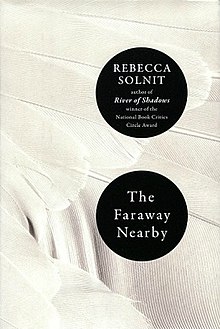
(Thanks to Roman Kudryashov for recommending this!)
The Faraway Nearby exists in a lineage of personal narrative and art criticism that I identify most strongly (and lovingly) with Didion but also includes, to varying extents, many other writers whom I find myself compelled to read even if I am not confident in their merit Rachel Cusk, Maggie Nelson, Alain de Botton. The latter is where I found myself most immediately drawing comparisons as I read the first few chapters of this book, and not particularly kind-hearted ones: Solnit's prose seemed to be self-consciously artiful and surface-level in a way that felt dissonant with the decline of her mother whose narrative defines and propels the book forward.
This hesitation — this lack of commitment to engage earnestly and deeply with the topics that she explores — fades as the book goes on. You're shuttled from one incredible core image — the mess of apricots, riping and decaying on a wooden floor — to a suite of motifs (glass; ice; mirrors) and you start to feel what Solnit is trying to share with you, which is the frenzied mess of connections and the way we search for meaning when meaning fails us.
This is a beautiful book. There are tiny moments and asides, like Solnit's rabbit-hole adventures into the mother who eats the corpses of her children to stay alive, that mark and haunt. There are big moments of personal narrative whose sleek diction belay the lack of clarity, and I (perhaps charitably) learned to love the book when I understood that Solnit was trying to be clear, and her failure is the point.
★★★★★
Highlights
Why go to Paradise when the dishes aren’t done?
The process is called “hematopoiesis,” from the ancient Greek words for blood and for making. Poetry comes from the same word, poiesis, and it belies Plato’s argument that art is only imitation. Our word for poetry is their word for all the making in the world, of chairs, of houses, of bombs, of books, of blood, of gods. Making a poem is like making a chair; a poem is as real as a chair and sometimes more useful.
Cooking is likewise a mode of transformation and a pleasure to which I often repair, and it sometimes seems so pleasurable because it is the opposite of writing; it engages all the senses; it’s immediate and unreproduceable and then it’s complete and eaten and over. The tasks are simple, messy, fragrant, and brief, and success and failure are easy to determine.
I am in this moment hosted by anonymous craftspeople long gone, or rather by their ideas and labor, surrounded by more ghosts in the books in the room and other remnants of trees, the language I speak, the body I inhabit with the adaptations and limitations of innumerable ancestors running through it, the city around me, the countless gestures, acts, devotions, that keep making the world.
It was about a small band of Inuit travelers he met nearly a century ago: “Halfway there, the weather changed suddenly. Oddly, it wasn’t the cold that nearly killed them, but heat. During the night their snow huts caved in and the frozen bits of skin, rotted meat and bones used to construct their sleds thawed and were eaten by the dogs. They had no food and no way to travel. After eating their dogs they began to starve. Atagutaluk then ate the bodies of her husband and children. When Peter met Atagutaluk she had since married the village leader. ‘I got a new husband, and got with him three new children. They are all named for the dead ones that only served to keep me alive so they could be reborn.’”
Listen: you are not yourself, you are crowds of others, you are as leaky a vessel as was ever made, you have spent vast amounts of your life as someone else, people who died long ago, as people who never lived, as strangers you never met.